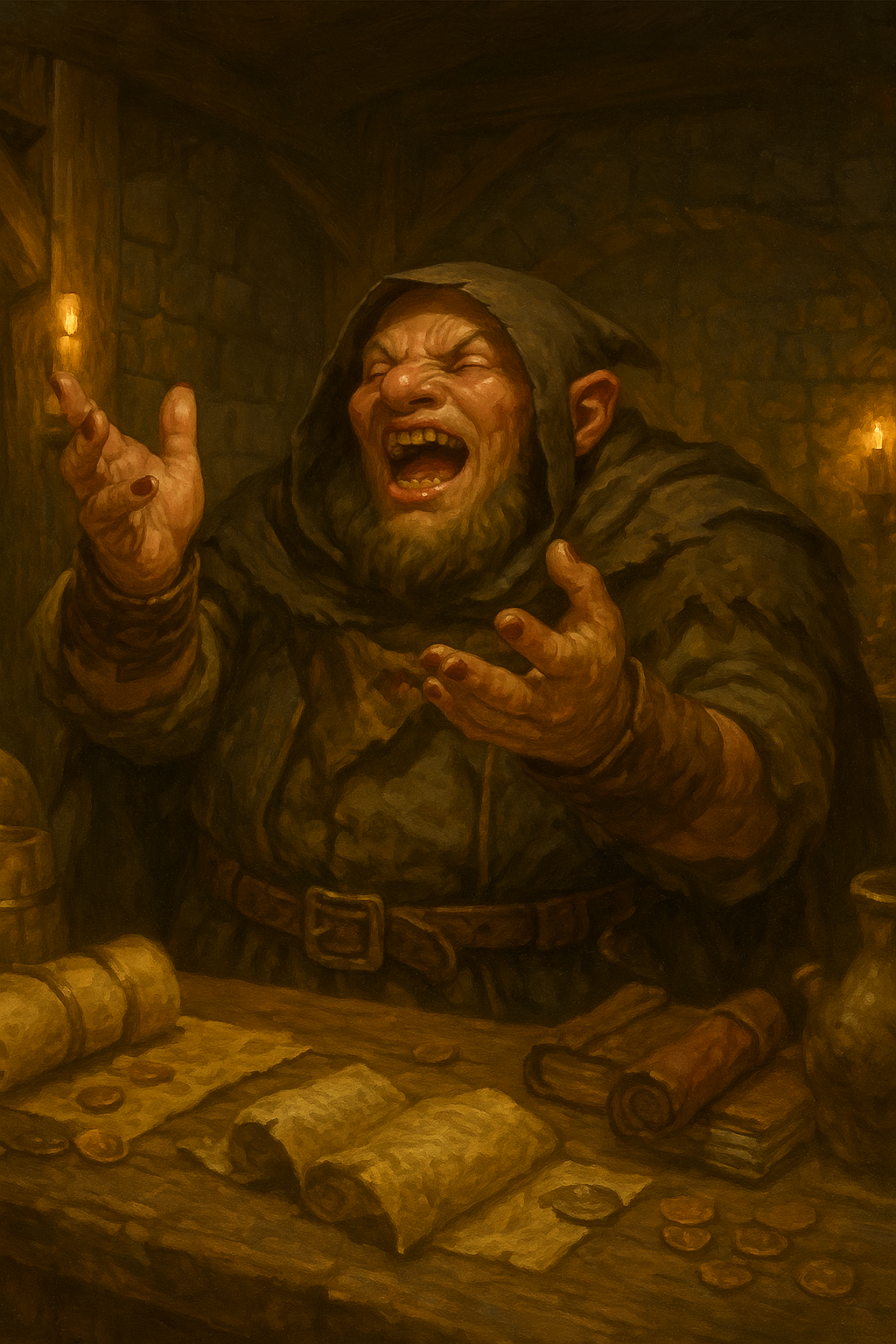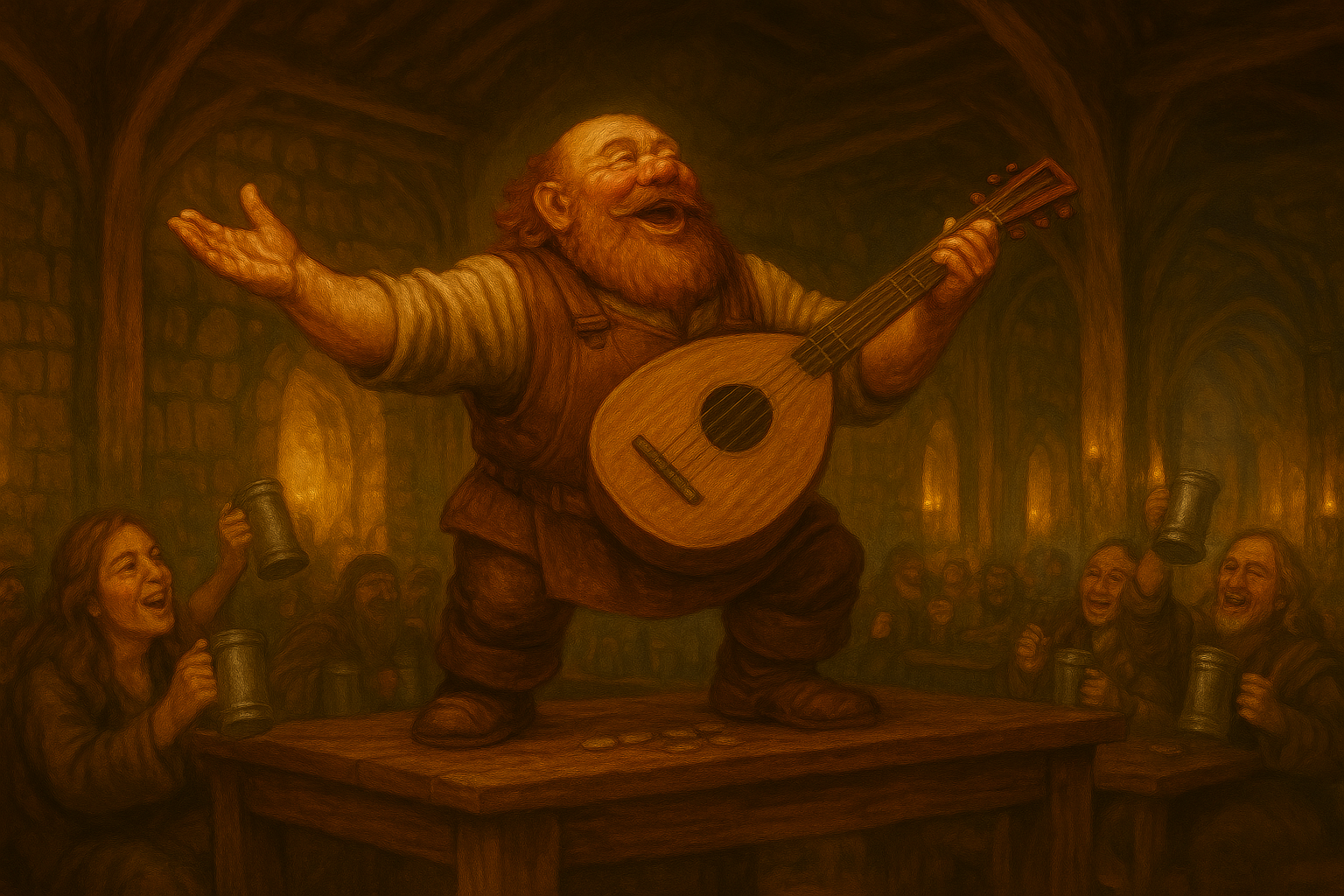Yer Table Ain’t a Solo Show. So Why’s He Hoggin’ the Plot?
“By Margann’s crusty beard, this ain’t ‘The Adventures of Throg the Mighty.’ It’s a campaign — not a one-man parade.”
There’s a curse worse than a lich’s laugh or a mimic with taste for steel. It’s called Main Character Syndrome. The player who thinks the whole world’s orbitin’ their sad backstory. Who rushes every plot twist, answers every NPC’s question, always acts first, talks loudest, dies most dramatically, and revives faster than the rest can blink.
It’s the Solo Warrior syndrome. And if left unchecked, it turns the campaign from shared story into a slow spiral toward resentment.
Now don’t go slammin’ yer tankard too fast — ‘cause here’s the twist: most players like this ain’t tryin’ to be selfish. They’re excited. They think they’re helpin’. They think they’re drivin’ the story forward. But what they’re really doin’… is runnin’ over everyone else in the cart.
The fix? It ain’t shame. It ain’t punishment. It’s prudence — the wisdom to know when not to speak — and humility — the strength to let someone else shine.
The Spotlight Burns If Ya Hog It
👉 Campaigns ain’t theatre for one. They’re tavern tales. We don’t need a star — we need a party. If yer table’s been tilted by one player’s ego, visit the GM Wisdom cellars or drop yer situation on Mike’s contact scroll. I’ll roast kindly — and teach firmly.
How to Nudge the Solo Star Back Into the Party
1. Call It In, Not Out
Talk in private. Not to embarrass, but to invite.
“Hey, I’ve noticed you’re takin’ a lot of lead. I love the energy — but I want to make sure everyone gets a chance to act and shine. You cool with me helpin’ balance that?”
Nine times outta ten, they’ll nod and thank ya. They just didn’t see it.
And if they do bristle? That’s pride talkin’. Show them this: Yer Not the Main Course — So Stop Hoggin’ the Spotlight
2. Redirect Spotlight with Questions
Give others the stage first:
“Before Throg smashes the door, do the rest of you want to investigate it?”
Use their name, look ‘em in the eye. This ain’t passive — it’s tablecraft.
It’s how The Strongest Character at the Table Is the One Who Listens works — not by shuttin’ down, but by makin’ room, laddie. That’s the bloody secret.
3. Build Group Scenes, Not Solo Arcs
Design plot beats that need cooperation. No “only I can enter” nonsense. Make quests that require two keys. A vow from another player. Emotional buy-in from the group.
The story lives in shared action, like what made The Sword That Remembers Every Kill It Makes so cursed — not what it was, but how it changed the party over time.
4. Encourage Prudence at the Table
If they’re talkin’ too much? Ask questions, don’t correct.
“What would your character not say right now?”
“Do you trust someone else to lead this scene?”
“Would your character be still for once?”
These aren’t barbs. They’re hammers for self-awareness.
5. Praise The Others Loudly, Me Lad.
When they don’t hog the scene — celebrate it.
“That was great how you held back there and let the rogue shine. Made the whole bloody thing feel like a team moment.”
This tells ‘em that strength comes in silence, too.
Let the Whole Party Bleed, Breathe, and Blaze
👉 Yer campaign is a forge. It don’t work unless every player’s metal gets tested. Help yer main-character-prone player find the joy of support, the glory in restraint. And if the spotlight’s stuck again, point ‘em to The Strongest Character at the Table Is the One Who Listens.
Extra Reading for the Over-Eager and the Outshone
FAQ
Q: What if the player’s style is just “loud and flashy”?
A: Style’s fine — until it drowns the table. Help ‘em channel it with the group, not over it.
Q: Can a main-character-type change mid-campaign?
A: Aye, with time and guidance. Especially if you reward the growth.
Q: Is it mean to take spotlight away?
A: Not if yer sharin’ it. You ain’t punishin’ — you’re balancin’. That’s real respect.



